- Home
- Maggie O'Farrell
After You'd Gone
After You'd Gone Read online
AFTER YOU’D GONE
Maggie O’Farrell was born in Northern Ireland and grew up in Wales and Scotland. She now lives in London. After You’d Gone is her first novel.
Maggie O'Farrell after you'd gone
PENGUIN BOOKS
PENGUIN BOOKS Published by the Penguin Group Penguin Putnam Inc.. 375 Hudwin Street. New York, New York 10014, U S.A. Penguin Books Ltd, 80 Strand, Iondon WC2R ORL, England Penguin Hooks Australia UJ, 250 Camberwell Road. Camberwell, Victoria 5124. Australia Penguin Book* Canada Ltd. 10 Alccxn Avenue, Toronto, Ontario, Canada M4V 3B? Penguin Books India (P) l.td. 11 Community Centre,
Pancltthccl Park. New Delhi 110017, India Penguin Books (N./.) Ltd, Cnr Rosedale and Airborne Roads,
Albany, Auckland, New Zealand Penguin Books (South Africa) (Pty) Ltd, 24 Sturdee Avenue,
Rowlunk, Johannesburg 21%. South Africa
Penguin Books Ltd. Registered Office*:
Harmondsworth, Middlesex, hngland
First published tn Great Bntain by Rcvrsv , an imprint of Headline Book Publishing 2000 First published in the United States of America by Viking Penguin, a member of Penguin Putnam Inc. 200I Published in Penguin Bonks 7002
Copyright © Maggie O'Farrcll, 2000
All rights reserved!
PUBLISHER’S NOTE This is a work of fiction. Names, characters, plates and incidents either are the product of thr author's imagination or are used fictitiously, an
O'Farrcll, Maggie , 1972 -After you'd gone / Maggie O'Farrcll. p. cm.
ISBN: l-f362-6360-3
I Coma- -Patients Fiction. 2. Suicidal Behavior Fiction.
3. London (England)—Fiction. 4. Scotland—Fiction. I. Title.
PR«>T»5.rW, A68 2001 823'.92 dc2) 00 04 5898
Conversion to epub by:
To my mother not being like Alice’s
My thanks to: Alexandra Pringle, Victoria Hobbs, Geraldine Cooke, Kate Jones, Barbara Trapido, Elspeth Barker, William Sutcliffe, Flora Gathorne-Hardy, Saul Venit, Ruth Metzstein, Georgie Bevan, Jo Aitchison, Ellis Woodman, John Hole, Morag and Esther McRae
Whatever has happened, happens always
Andrew Greig ,
The past falls open anywhere
Michael Donaghy
prologue
The day she would try to kill herself, she realised winter was coming again. She had been lying on her side, her knees drawn up; she’d sighed, and the heat of her breath had vaporised in the cold air of the bedroom. She pushed the air out of her lungs again, watching. Then she did it again, and again. Then she wrenched back the covers and got up. Alice hated winter.
It must have been around 5 a.m.; she didn’t need to look at her clock, she could tell from the glow behind the curtains. She’d been awake most of the night. The weak dawn light cast the walls, bed and floor in greyish-blue granite, and her shadow as she crossed the floor was a grainy, unfocused smudge.
In the bathroom, she twisted the tap and drank straight from it, bending over and pushing her mouth into the pressurised, icy flow, gasping with the shock of the cold. Wiping her face on the back of her hand, she filled the toothmug and watered the plants on the bath edge. It had been so long since she’d cared for them that the parched soil didn’t absorb the water, and it collected on the surface in accusing, mercuried drops.
Alice dressed quickly, putting on whatever clothes she found discarded on the floor. She stood at the window, looking down into the street for a moment, then went downstairs, slinging her bag over her shoulder, closing the front door behind her. Then she just walked, head bent, coat pulled around her.
She walked through the streets. She passed shops with drawn-down, padlocked shutters, street-cleaning lorries scrubbing the kerbs with great circular black brushes, a group of bus drivers smoking and chatting on a corner, their hands curled around polystyrene cups of steaming tea. They stared as she passed, but she saw none of this. She saw nothing but her feet moving beneath her, disappearing and reappearing from under her with a rhythmic regularity.
It was almost fully light when she realised she’d reached King’s Cross. Taxis were swinging in and out of its forecourt, people milled through its doors. She wandered inside, with a vague idea of buying a cup of coffee, perhaps, or something to eat. But when she entered the white-lit building, she became mesmerised by the vast expanse of the departures board. Numbers and letters flicker-flacked over each other; city names and times were being arranged and rearranged in letters caught on hidden electronic rollers. She read the names to herself — Cambridge, Darlington, Newcastle. I could go to any of these places. If I wanted to. Alice felt up her sleeve for the bulk of her watch. It was too big for her, really, its face wider than her wrist, but she’d pierced the scuffed strap with extra holes. She glanced at it, then automatically lowered her arm again before realising that she hadn’t in fact taken in what she’d seen. She raised the watch to her face again, concentrating this time. She even pressed the little button at the side that illuminated the tiny grey screen — where constantly shifting liquid crystal displayed the time, date, altitude, air pressure and temperature — in a bright peacock-blue light. She had never worn a digital watch before this. It had been one of John’s. His watch told her it was 6.20 a.m. And that it was a Saturday.
Alice turned her face up again to the departures board.
Glasgow, Peterborough, York, Aberdeen, Edinburgh. Alice blinked. Read it again: Edinburgh. She could go home. See her family. If she wanted to. She looked to the top of the column to see the train’s time — 6.30 a.m. Did she want to? Then she was walking fast towards the ticket office and signing her name in cramped, cold-handed writing. ‘The Scottish Pullman to Edinburgh’ the sign said as she got on, and she almost smiled.
She slept on the train, her head resting against the thrumming window, and she was almost surprised to see her sisters waiting at the end of the platform in Edinburgh. But then she remembered calling Kirsty from the train. Kirsty had her baby in a sling and Beth, Alice’s younger sister, had Annie, Kirsty’s daughter, by the hand. They were straining up on tiptoe to find her and when they caught sight of her, they waved. Kirsty hitched Annie on to her hip and they ran towards her. Then she was hugging both of them at once and although she knew their boisterousness masked concern and she really wanted to show them she was all right, she was fine, the feel of both her sisters’ hands pressing into her spine meant that she had to turn her head away and pick up Annie and pretend to be burying her face in the child’s neck.
They hustled her to the station cafe, divested her of her bag and placed in front of her a coffee adorned with white froth and a sprinkling of chocolate. Beth had done an exam the day before and she related the questions she’d been asked and how the invigilator had smelt. Kirsty, trailing nappies, feeding bottles, jigsaws, Plasticine, held the baby, Jamie, in the crook of her arm while expertly harnessing Annie into a pair of reins. Alice rested her chin in her hands, listened to Beth and watched Annie cover a piece of newspaper with green crayon. The vibrations of Annie’s strenuous efforts travelled across the table and up the twin violin-bow bones of Alice’s forearms to reverberate in her cranium.
She got up and went out of the cafe to find the toilet, leaving Kirsty and Beth discussing what to do that day. She crossed the waiting room and pushed through the steel turnstile into the station Superloo. She couldn’t have been absent from the cafe table where her sisters and niece and nephew were sitting for more than four minutes, but during that time she saw something so odd and unexpected and sickening that it was as if she’d glanced in the mirror to discover that her face was not the one she thought she had. Alice looked, and it seemed to her t
hat what she saw undercut everything she had left. And everything that had gone before. She looked again, and then again. She was sure, but didn’t want to be.
She bolted out of her loo, shoving her way through the turnstile. In the middle of the con course, she stopped still for a moment. What would she say to her sisters? Can’t think about this now, she told herself, just can’t; and she slammed down on top of it something heavy and wide and flat, sealing up the edges, tight as a clam.
She was walking fast back through the cafe, reaching down beside her chair for her bag.
‘Where are you going?’ Kirsty asked.
‘I have to go,’ Alice said.
Kirsty stared at her. Beth stood up.
‘Go?’ Beth repeated. ‘Go where?’
‘Back to London.’
‘What?’ Beth sprang forward and seized hold of the coat Alice was pulling on. ‘But you can’t. You’ve only just got here.’
‘Have to go.’
Beth and Kirsty exchanged quick looks.
‘But . . . Alice . . . what’s happened?’ cried Beth. ‘What’s wrong, what’s wrong? Please don’t go. You can’t go like this.’
‘Have to,’ Alice muttered again, and walked off to find the next London train.
Kirsty and Beth gathered up the children, their bags and the baby clutter, and hurried after her. There was a train just about to depart, Alice found, so she ran to the platform, her sisters following behind her, calling her name over and over.
On the platform, she hugged both of them. ‘Bye,’ she whispered. ‘Sorry.’
Beth burst into tears. ‘I don’t understand,’ she wailed. ‘Tell us what the matter is. Why are you going?’
‘Sorry,’ she said again.
Getting on the train, Alice felt suddenly malcoordinated. The gap between the train step and the platform edge down to the tracks seemed to yawn wide into a huge, uncrossable crevasse. Her body didn’t seem to be getting the right spatial information from her brain: she reached for the handle to pull herself across the crevasse, but missed, swayed and lurched backwards into a man standing behind her.
‘Steady,’ he said, and took her elbow to help her on.
Beth and Kirsty crowded into the window when she sat down. Kirsty was crying too now, and they waved frantically as the train moved off, running beside her for as long as they could before it picked up speed and their strides flagged. Alice could not wave back, she could not look at them and see their four blonde heads running beside the train, captured by the frame of the window as if on a reel of flickering Super-8.
Her heart was jumping in her chest so hard as she travelled that the edges of her vision pulsed in giddy sympathy. Rain screed back along the window. She avoided the eye of the reflection whizzing along beside her in another, reversed, tilted ghost carriage that skimmed over the fields as they hurtled towards London.
The air in the house felt icy when she got back. She fiddled with the boiler and thermostat, reading aloud to herself the incomprehensible instructions, peering at the diagrams bristling with arrows and dials. The radiators coughed and gulped, digesting the first heat of the year. In the bathroom, she stuck her fingers into the compost of the plants. It felt damp.
She was just about to go back downstairs, she thought, when she just sat down where she was — on the top step. She looked at John’s watch again and was astonished to see it was only five in the afternoon. She checked it three times: 17.02. That definitely meant five o’clock. Her trip to Edinburgh seemed unreal now. Had she really gone all that way and then come back? Had she really seen what she thought she saw? She didn’t know. She clenched her hands around her ankles and let her head fall on to her knees.
When she raised it again, the rain had stopped. There was a peculiar stillness about the house and it seemed to have got dark very suddenly. Her knuckle and finger joints ached, and as she flexed them they made sharp, cracking sounds that echoed round the stairwell. She hauled herself up by the banister and went slowly down the stairs, leaning her weight against the wall.
In the sitting room she stood at the window. The streetlights had gone on. Over the road a television flickered behind net curtains. The roof of her mouth felt swollen and bruised, as if she’d been sucking boiled sweets. Lucifer, appearing from somewhere, leapt noiselessly on to the window-sill and began rubbing his head against her folded arms. She smoothed the velvet of his throat with her fingertips, feeling the rumble of his purr.
She snapped on a light and the cat’s pupils narrowed, like the closing of a fan. He jumped to the floor and circled her ankles, mewing loudly. She watched him as he prowled the room, casting sideways looks at her, swishing his long black tail. In the overhead light it was possible to see the ghost of a tabby in the monochrome sheen of his fur. Some recess of her mind told her: he’s hungry. The cat needs feeding. Feed the cat, Alice.
She went through to the kitchen. The cat raced ahead of her through the door and began leaping at the fridge. There was nothing in the cupboard where she kept his food but a tired-looking cardboard box of cat biscuits and the brown rust-rings of tins long since eaten. She tipped out the box. Three biscuits fell on to the lino. After sniffing at them for a time, Lucifer crunched them delicately.
‘Have I been neglecting you?’ She stroked him. ‘I’ll go out and buy some catfood.’
Lucifer followed at her heels, aghast that she seemed to have changed her mind and wasn’t going to feed him after all. At the front door, she got her keys and wallet from her bag. The cat slipped out of the door with her and sat on the doorstep.
‘Back in a minute,’ she murmured and clicked the gate shut behind her.
Maybe it was something to do with the rhythm of her steps hitting the tarmac or maybe it was being out among crowds of people again rather than in the cool, hermetic interior of the house, but as she walked down Camden Road to the supermarket it all started coming back to her. She could see herself in that white melamine cubicle, walls inscribed with skewered hearts and legends of love. She could see herself washing her hands again at the stainless-steel basin, sprayed with silver beads of water. She tried to stop herself thinking about this. Tried to fill her mind with other things, think about Lucifer, about what else she could buy in the supermarket. She had leant on the gleaming soap dispenser; lurid pink soap had coiled into her wet palm, lathering into oiled bubbles under the water. Behind her in the cubicles, two teenage girls had been discussing a dress one of them was going to buy that day. ‘Do you not think it makes me look a bit kind of flouncy?’ one had shouted. ‘Flouncy? Well, now you come to mention it.’ ‘Fuck off, fuck off!’ What had happened then? What had occurred a few moments later was so disorientating, it was hard to order things in her head . . . Did she need anything else? Milk, maybe? Or bread? . . . Alice had turned then towards the hand-dryer and pressed the chrome button, passing her hands over each other. It had one of those little mirrors stuck to the front. She has never really known why they do that. You’re supposed to be able to dry your hair if you turn the nozzle around, or something, but she’s never found the need to dry her hair in a public toilet . . . What should she do when she got back? Maybe she could read something. She could buy a paper. How long is it since she read a paper anyway? . . . The whole place had seemed reflective — the shining porcelain tiles, the steel basins, the mirror above them, and the mirror on the hand-dryer . . . Maybe she should call Rachel. She couldn’t remember when she last spoke to her. Rachel was probably cross with her . . . The girls’ voices had been bouncing off the walls. One of them had raised herself up on to the top of the cubicle and was looking down on her friend. Alice had, for some reason — why? why did she do that? — stepped closer to the hand-dryer, and the new angle made something behind her appear in the tiny square mirror . . . Perhaps Rachel wasn’t talking to her. That would be strange. They’d never fallen out before. Perhaps she would get a basket at the shop, or a trolley, yes, a trolley would be good. She could fill it with everything she needed. Then she w
ouldn’t have to go again for a while. But how would she carry it all home? . . . Still with her hands under the hot jet of air, she had stared at the mirror and then, ever so slowly, so slowly that it seemed to have taken minutes, turned towards them.
Alice was by now standing at the pedestrian crossing. The green figure, legs parted in a purposeful stride, was illuminated on the traffic-light opposite. Over the road, she could see the supermarket; figures cruising through the neon-lit aisles. It seemed to her that her life was narrowing down to a vanishing point. People flowed around her, crossing the road, moving on. But she stayed still.
Someone nudged her in the back and she was pushed towards the edge of the pavement. The green figure was blinking on and off. Final stragglers were dashing across the road before the lights changed. The stationary red figure appeared and there was a moment of suspended calm before the waiting line of cars gunned their engines. As they powered past her, hurling fumes up into her face, their solidity seemed enviable to her — edgeless, slick constructions of steel, glass and chrome. The soles of Alice’s shoes peeled away from the tarmac, and she stepped off the kerb.
part | one
The only bit Alice can see of her father is the soles of his shoes.
They are a faded brown, striated with the grit and terrain of the pavements he has walked. She is allowed to run along the pavement outside their house to meet him coming home from work in the evening. In the summertime she sometimes runs in her nightie, its pale folds catching around her knees. But now it’s winter — November, maybe. The soles of the shoes are curved around the branch of a tree at the bottom of their garden. She tips back her head as far as it will go. The foliage rustles and thrashes. Her father’s voice swears. She feels a shout welling like tears in her throat, then the coarse orange rope lowers itself, slightly coiled like a cobra from the branches.

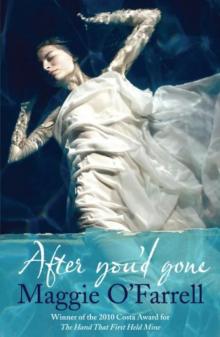 After You'd Gone
After You'd Gone The Hand That First Held Mine
The Hand That First Held Mine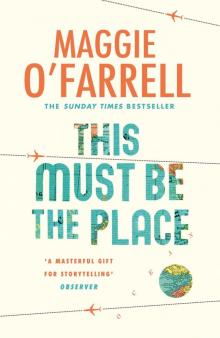 This Must Be the Place
This Must Be the Place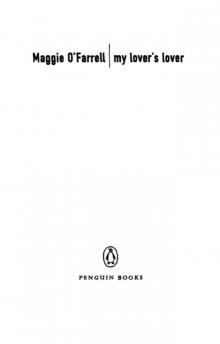 My Lover's Lover
My Lover's Lover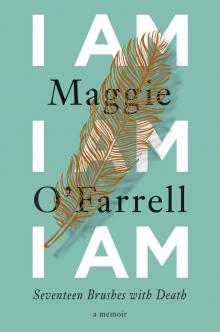 I Am, I Am, I Am: Seventeen Brushes With Death
I Am, I Am, I Am: Seventeen Brushes With Death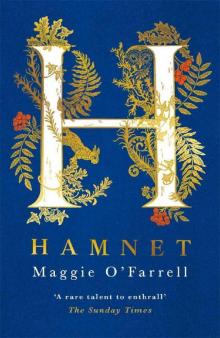 Hamnet
Hamnet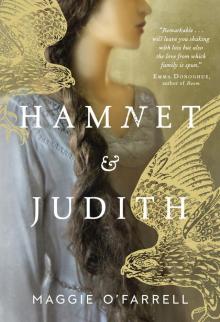 Hamnet and Judith
Hamnet and Judith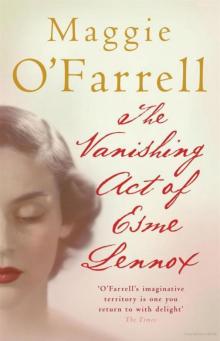 The Vanishing Act of Esme Lennox
The Vanishing Act of Esme Lennox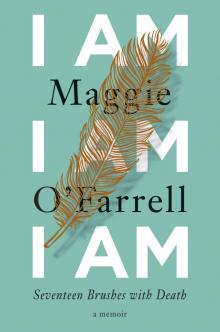 I Am, I Am, I Am
I Am, I Am, I Am